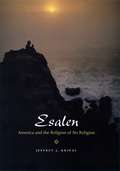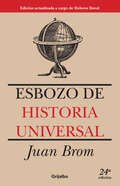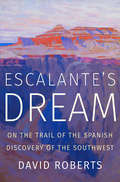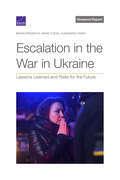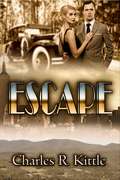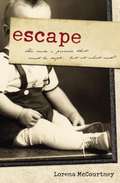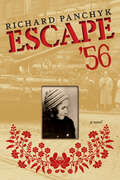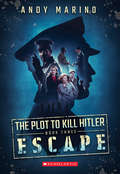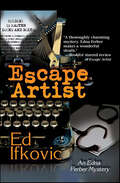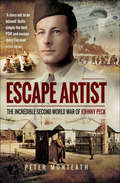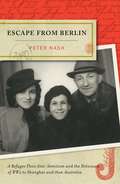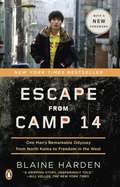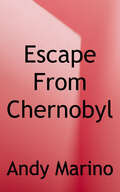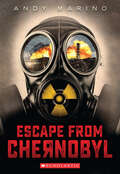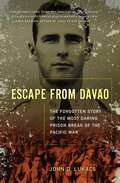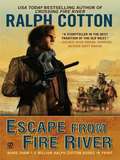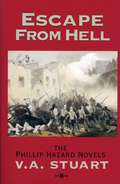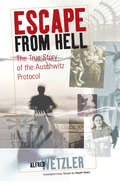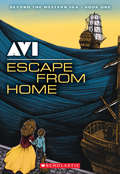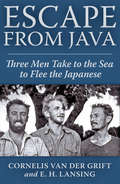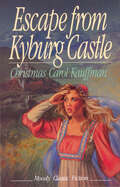- Table View
- List View
Esalen: America and the Religion of No Religion
by Jeffrey J. KripalJeffrey Kripal here recounts the spectacular history of Esalen, the institute that has long been a world leader in alternative and experiential education and stands today at the center of the human potential movement. Forged in the literary and mythical leanings of the Beat Generation, inspired in the lecture halls of Stanford by radical scholars of comparative religion, the institute was the remarkable brainchild of Michael Murphy and Richard Price. Set against the heady backdrop of California during the revolutionary 1960s, Esalen recounts in fascinating detail how these two maverick thinkers sought to fuse the spiritual revelations of the East with the scientific revolutions of the West, or to combine the very best elements of Zen Buddhism, Western psychology, and Indian yoga into a decidedly utopian vision that rejected the dogmas of conventional religion. In their religion of no religion, the natural world was just as crucial as the spiritual one, science and faith not only commingled but became staunch allies, and the enlightenment of the body could lead to the full realization of our development as human beings. “An impressive new book. . . . [Kripal] has written the definitive intellectual history of the ideas behind the institute.”—San FranciscoChronicle “Kripal examines Esalen’s extraordinary history and evocatively describes the breech birth of Murphy and Price’s brainchild. His real achievement, though, is effortlessly synthesizing a dizzying array of dissonant phenomena (Cold War espionage, ecstatic religiosity), incongruous pairings (Darwinism, Tantric sex), and otherwise schizy ephemera (psychedelic drugs, spaceflight) into a cogent, satisfyingly complete narrative.”—Atlantic Monthly “Kripal has produced the first all-encompassing history of Esalen: its intellectual, social, personal, literary and spiritual passages. Kripal brings us up-to-date and takes us deep beneath historical surfaces in this definitive, elegantly written book.”—Playboy
Esbozo de historia universal
by Juan BromUn libro clave en el aprendizaje del conocimiento histórico. Para numerosas generaciones de estudiantes, el Esbozo de historia universal ha sido un libro clave en el aprendizaje del conocimiento histórico. A la vez, ha acercado la historia a gran cantidad de personas, curiosas del pasado de la humanidad. El profesor Brom, preocupado por una constante actualización y difusión de sus obras, creó una comisión de especialistas encargada del cuidado póstumo de sus publicaciones. Se presenta aquí la primera edición revisada y actualizada por dicha comisión. El criterio que inspira esta obra es científico: en ella, la historia es considerada como una constante evolución, producto de la actividad humana. El texto analiza los distintos periodos desde la aparición del hombre hasta diciembre de 2012, presenta, también, una cronología de los acontecimientos de 1945 a la fecha y concluye con reflexiones sobre el carácter y el sentido del conocimiento histórico. De ese modo, el Esbozo de historia universal ofrece una amplia perspectiva del pasado que ayuda a comprender los problemas del mundo actual y a proyectar el progreso futuro del hombre. Como resultado de la experiencia docente de su autor, esta obra constituye un valioso texto de consulta para la enseñanza de la Historia en las escuelas de nivel medio superior.
Escalante's Dream: On The Trail Of The Spanish Discovery Of The Southwest
by David RobertsFamed adventure writer David Roberts retraces the route of the legendary Domínguez-Escalante expedition. In July 1776 a pair of Franciscan friars, Francisco Atanasio Domínguez and Silvestre Vélez de Escalante, were charged by the governor of New Mexico with discovering a route across the unknown Southwest to the new Spanish colony in California. They had other goals as well, some of them secret: converting the indigenous natives along the way to the true faith, discovering a semi-mythical paradise known as Teguayó, hunting for sources of gold and silver, and paving the way for Spanish settlements from Santa Fe to Monterey. In strict terms, the expedition failed. Running out of food and beset by an early winter, the twelve-man team gave up in what is now western Utah. The retreat to Santa Fe became an ordeal of survival. The men were reduced to eating their own horses while they searched for a crossing of the raging Colorado River in Glen Canyon. Seven months after setting out, Domínguez and Escalante staggered back to Santa Fe. Yet in the course of their 1,700-mile voyage, the explorers discovered more land unknown to Europeans than Lewis and Clark would encounter a quarter-century later. Other writers, using Escalante’s brilliant and quirky diary as a guide, have retraced the expedition route, but David Roberts is the first to dig beneath its pages to question and ponder every turn of the team’s decision-making and motivation. Roberts weaves the personal and the historical narratives into a gripping journey of discovery through the magnificent American Southwest.
Escalation in the War in Ukraine: Lessons Learned and Risks for the Future
by Bryan Frederick Alexandra Stark Mark CozadThis report evaluates the potential for further escalation in the conflict in Ukraine, including the prospects for escalation to Russian nuclear use. The report is intended to inform U.S. and NATO policymakers as they consider how to avoid further escalation of the conflict while assisting Ukraine in its efforts to defeat the Russian invasion and to better inform the public debate around these issues.
Escandalizada por el beso de un canalla (Conectados por un beso #5)
by Amanda MarielBradford Seymour, el picaresco lord Greenwich, es conocido por su actitud despreocupada y su corazón, supuestamente, de hielo. Por otro lado, Skye Campbell, la viuda lady Hampton, es una belleza enérgica con una afición por las travesuras. Estas dos almas completamente opuestas están destinadas a encontrarse de la manera más inesperada. Mientras la nieve cubre el campo de un pintoresco pueblo inglés, un giro fortuito del destino atrapa a Bradford y a Skye juntos en la acogedora posada Rosewood durante la temporada más cautivadora del año: la Navidad. Obligados a vivir juntos, sus diferencias se hacen evidentes, y las chispas que saltan no provienen solo del crepitar de la chimenea. Entre la calidez de las celebraciones navideñas y la magia de una blanca Navidad, Skye y Bradford descubren que bajo la fachada helada se esconde un corazón que anhela amor, y tras el ardiente exterior, un deseo de comprensión. ¿Podrá el espíritu de la Navidad obrar sus milagros, derretir sus corazones y unir a dos almas aparentemente tan diferentes como la noche y el día? Escápate a un mundo invernal de amor, risas y romance inesperado en este cuento de Navidad de la Regencia, donde el gélido lord y la fogosa dama descubrirán que el amor no sabe de estaciones y que bajo el muérdago, todo es posible.
Escandalosa
by Éli Assunção Amanda MarielUma encalhada por natureza, Jane há muito tempo aceitou que se tornaria uma solteirona. Talvez tal destino fosse o melhor. Depois de tudo o que testemunhou, viu em primeira mão o que um casamento miserável podia fazer com uma dama. Ainda assim se atreveu a sonhar – isso é, até se encontrar completamente escandalizada por um cavalheiro com os modos de um javali selvagem. Depois que Caleb Wesley, Lorde Keery, falhou em proteger a única pessoa que contava com ele, abraçou a vida de canalha. Mantinha os seus vícios perto – meretrizes, apostas e bebidas – e não tinha nenhuma intenção de desistir deles. Até que acidentalmente arruinou uma dama e foi forçado a pedi-la em casamento. Duas pessoas que foram atadas por circunstâncias indesejadas descobrem algo que nenhum acreditou que algum dia teria. Poderiam deixar as velhas feridas para trás e acreditar por tempo o suficiente para abraçar o presente que o destino tinha concedido a eles?
Escandalosa Redenção
by Éli Assunção Amanda MarielEla nunca o quis... Arruinada pelo escândalo, Claudia Akford sobreviveu aos anos do seu casamento com um animal cruel. Viúva, ela está determinada a recuperar o seu lugar entre a sociedade, mas Lorde Shillington é a tentação personificada. Bondoso e gentil, e ainda assim masculino e pecaminosamente bonito, ele seria o amante perfeito, mas ele quer mais do que ela está disposta a dar. Ele precisava dela... Enquanto Henry Shillington conhece um pouco sobre a linda e infame Lady Claudia Akford, ele é atingido por sua bondade, talento e comportamento espirituoso. Quanto mais tempo passa em sua companhia, mais sonho com um futuro ao lado dela. Mas a dama resiste às suas propostas honrosas, e uma amante nunca serviria para ele. Poderia duas pessoas cautelosas superar as dores do passado, um velho escândalo e as convenções sociais para viver o verdadeiro amor?
Escandalosas Intenções
by Éli Assunção Amanda MarielQuando confrontado com a possibilidade de perder o suporte do pai, o notório libertino Lorde Julian Luvington coloca seus olhos sobre Lady Sarah. Ela é tão respeitável quanto seus pares, exatamente o que o seu pai ordenou. Mas a dama não será fácil de conquistar. Lady Sarah Roseington está determinada a casar por amor ou permanecer solteira, e fará o que estiver ao seu alcance para obter a liberdade que é garantida aos homens. Um escroque como Lorde Luvington poderia destruir sua reputação conquistada a duras penas, mas casar com ele também oferece a ela as oportunidades que não pode alcançar por si só. O que uma dama faria? Quando Lorde Luvington se recusa a abandonar a sua caça, Lady Sarah propõe um acordo. Só que o preço pode ser bem mais alto do que qualquer um deles deseja pagar. Lady Sarah pode perder muito mais do que a posição social e Julian pode perder seu coração.
Escape
by Charles R KittleNew York speakeasy owner Drake Lauren and his sidekick Danny escape from a torrid gun chase, and in a moment of reflection, Drake takes up residence in a Massachusetts community. In a world apart from New York's wickedness, Drake senses, searches for something he can't grasp. He flounders, unfamiliar and uncomfortable with the rush of sensations he finds in this parochial New England region. Two charming but unsettling women enter his life. Though trying to resolve his New York connections he knows he can't break free of gangsters determined to eliminate him. And while searching for the path to redemption he discovers it's neither clear nor guaranteed—and complicated by women who add their demands. Drake needs a daring solution.
Escape
by Lorena MccourtneyBeth Curtis promised her brother and his wife that if anything should happen to them, she would raise their son as if he were her own. So when a double tragedy leads to their deaths at the height of the Great Depression, a brokenhearted Beth steps forward to keep her vow. However, Joey is also the grandson of Nat Wilkerson, a dangerous and wealthy tycoon, who will stop at nothing to gain sole custody of the child, sending his son Guy to find the child. Beth and her beloved nephew Joey escape by train into the night, but to her dismay, Guy follows-though not for the reasons she suspects.
Escape '56: A Novel
by Richard PanchykA dramatic historical novel of escape during occupation and wartime and of starting life over in a new country.Escape &’56 is a novel based on the life of young Elizabeth Molnár (the author&’s mother) and her family as they lived through the harrowing days of the Hungarian Revolution. The book recounts the story of the inspiring student-led uprising and the shocking Soviet invasion that followed, leading to Elizabeth&’s perilous nighttime escape from Hungary through the border woods in November, 1956. Weaving historical fact with the accounts of his relatives&’ dramatic experiences, Panchyk&’s cinematic, fictional narrative feels both personal and universal. When the Hungarian Revolution failed, more than 200,0000 Hungarians (two percent of the population) fled the country, fearing for their lives and an even more oppressive regime than they&’d already endured. Elizabeth&’s adventure continues, first as a refugee in Austria, and then in the United States where she and her family start a new life with little money, few possessions, and almost no understanding of English. Escape &’56 is a gripping novel, filled with historical detail and incorporating recollections from the author&’s mother, aunt, and grandmother.
Escape (The Plot to Kill Hitler #3)
by Andy MarinoBased on the real-life scheme to take down one of history's greatest monsters, this heart-pounding trilogy puts two courageous kids at the center of the plot to kill Adolf Hitler.July 1945.The Nazis are out for blood.After the attempt on Hitler's life, the Hoffmanns must flee Berlin. Max and Gerta, along with their mother and Kat Vogel, are forced to leave their father behind-at the mercy of the Gestapo. Following the same path that the Becker Circle used to smuggle Jewish escapees to safety, the Hoffmanns begin a desperate journey across Germany, through occupied France, and into Spain.But going on the run is incredibly dangerous, and the Nazis have invoked the blood guilt laws. Anyone thought to be connected to the assassination plot, along with their families, will be killed or sent to the camps. The Hoffmanns have friends who are willing to help them escape, but their family is still incomplete.Max can only hope that he'll see his father again.
Escape Artist (Edna Ferber Mysteries #2)
by Ed Ifkovic"Who would have thought that, of all the real-life characters to have a second life as detectives, Edna Ferber, now largely forgotten as a writer, would emerge as one of the best?" —Booklist STARRED reviewIn 1904, Edna Ferber is a 19-year-old girl reporter for the Appleton, Wisconsin, Crescent, an occupation her family considers scandalous for a proper young girl. By chance, she interviews Harry Houdini, in town visiting old friends. When beautiful young Frana Lempke disappears and is soon discovered murdered, the crime baffles the local police; Frana disappeared from a locked room at the high school. Edna asks Houdini for help in solving the murder. But as Edna pursues the story, she senses that she is being followed.Though she is dedicated to her blind father, Edna's homelife is in disorder. And now the newsroom has become a hostile environment, with a new city editor determined to undermine her....
Escape Artist: The Incredible Second World War of Johnny Peck
by Peter MonteathThe never-before-told story of World War II escape artist extraordinaire, Johnny Peck.In August 1941, an eighteen-year-old Australian soldier made his first prison break an audacious night-time escape from a German prisoner-of-war camp in Crete. Astoundingly, this was only the first of many escapes.An infantryman in the 2/7 Battalion, Johnny Peck was first thrown into battle against Italian forces in the Western Desert. Campaigns against Hitlers Wehrmacht and Luftwaffe in Greece and Crete followed. When Crete fell to the Germans at the end of May 1941, Peck was trapped on the island with hundreds of other men. On the run, they depended on their wits, the kindness of strangers, and sheer good luck.When Pecks luck ran out, he was taken captive by the Germans, then the Italians. Later, after his release from a Piedmontese jail following the Italian Armistice of 1943, and at immense risk to his own life, Peck devoted himself to helping POWs cross the Alps to safety. Captured once more, Peck was sentenced to death and detained in Milans notorious, Gestapo-run San Vittore prison until escaping again, this time into Switzerland.Historian Peter Monteath reveals the action-packed tale of one young Australian soldier and his remarkable war.
Escape From Berlin
by Peter NashA Holocaust survivor tells his compelling family story of escape and survival in China and Australia during WW2. Living in Berlin in 1939, three-year-old Peter Nachemstein and his parents were forced to escape Nazi Germany by fleeing to Shanghai – one of the only havens left for them and 18,000 other European Jews. Although safe, they became displaced and isolated from the rest of their family, who were scattered across Europe. In Escape from Berlin, Peter Nash retraces what became of his family members following the devastating impact of WW2. Using remarkable photographs and documents to bring their captivating stories to life, Peter recounts his own experiences of dislocation as a young boy in alien Shanghai, and then later as a teenager and adult in Australia. Meticulously researched and impeccably detailed, Escape from Berlin brings light to a fascinating but not widely known chapter of Holocaust history in a family story that reflects the experiences of many in the Jewish community.
Escape From Camp 14: One Man's Remarkable Odyssey from North Korea to Freedom in the West
by Blaine HardenThe heart-wrenching New York Times bestseller about the only known person born inside a North Korean prison camp to have escaped North Korea's political prison camps have existed twice as long as Stalin's Soviet gulags and twelve times as long as the Nazi concentration camps. No one born and raised in these camps is known to have escaped. No one, that is, except Shin Dong-hyuk. In Escape From Camp 14, Blaine Harden unlocks the secrets of the world's most repressive totalitarian state through the story of Shin's shocking imprisonment and his astounding getaway. Shin knew nothing of civilized existence--he saw his mother as a competitor for food, guards raised him to be a snitch, and he witnessed the execution of his mother and brother. The late "Dear Leader" Kim Jong Il was recognized throughout the world, but his country remains sealed as his third son and chosen heir, Kim Jong Eun, consolidates power. Few foreigners are allowed in, and few North Koreans are able to leave. North Korea is hungry, bankrupt, and armed with nuclear weapons. It is also a human rights catastrophe. Between 150,000 and 200,000 people work as slaves in its political prison camps. These camps are clearly visible in satellite photographs, yet North Korea's government denies they exist. Harden's harrowing narrative exposes this hidden dystopia, focusing on an extraordinary young man who came of age inside the highest security prison in the highest security state. Escape from Camp 14 offers an unequalled inside account of one of the world's darkest nations. It is a tale of endurance and courage, survival and hope.
Escape From Chernobyl
by Andy MarinoFrom Andy Marino, author of The Plot to Kill Hitler series, comes another fast-paced historical thriller chronicling one family's desperate bid to escape the deadly Chernobyl disaster. <p><p>Alina and Lev are two siblings living in Pripyat, one of the Soviet Union's proud nuclear cities. Both are asleep in their beds. Their cousin, Yuri, is a custodian at the Chernobyl Nuclear Power Plant, where he's fiercely attacking a spill in the hallway with a mop. Alina's best friend, Sofiya, sleeps just a few doors down. Her father is an engineer at the plant, a fact that has always filled her with pride. <p><p>In five minutes, Reactor No. 4 will explode in a ball of fire. It will expel radiation across their town for nine days before it's finally contained. For the people of Pripyat, it will be far too late. Two young siblings flee the Chernobyl disaster with their parents, but the Communist party is on their heels. Meanwhile, the friends and family they were forced to leave behind must contend with a disinformation campaign that's determined to pretend nothing is wrong-even as deadly radiation spills into the air.
Escape From Chernobyl
by Andy MarinoFrom Andy Marino, author of The Plot to Kill Hitler series, comes another fast-paced historical thriller chronicling one family's desperate bid to escape the deadly Chernobyl disaster.26 April 198601:18Alina & Lev are two siblings living in Pripyat, one of the Soviet Union's proud nuclear cities. Both are asleep in their beds.Their cousin, Yuri, is a custodian at the Chernobyl Nuclear Power Plant, where he's fiercely attacking a spill in the hallway with a mop.Alina's best friend, Sofiya, sleeps just a few doors down. Her father is an engineer at the plant, a fact that has always filled her with pride.In five minutes, Reactor No. 4 will explode in a ball of fire. It will expel radiation across their town for nine days before it's finally contained. For the people of Pripyat, it will be far too late.—Two young siblings flee the Chernobyl disaster with their parents, but the Communist party is on their heels. Meanwhile, the friends and family they were forced to leave behind must contend with a disinformation campaign that's determined to pretend nothing is wrong-even as deadly radiation spills into the air.
Escape From Davao: The Forgotten Story of the Most Daring Prison Break of the Pacific War
by John D. LukacsOn April 4, 1943, ten American prisoners of war and two Filipino convicts executed a daring escape from one of Japan's most notorious prison camps. The prisoners were survivors of the infamous Bataan Death March and the Fall of Corregidor, and the prison from which they escaped was surrounded by an impenetrable swamp and reputedly escape-proof. Theirs was the only successful group escape from a Japanese POW camp during the Pacific war. Escape from Davao is the story of one of the most remarkable incidents in the Second World War and of what happened when the Americans returned home to tell the world what they had witnessed. Davao Penal Colony, on the southern Philippine island of Mindanao, was a prison plantation where thousands of American POWs toiled alongside Filipino criminals and suffered from tropical diseases and malnutrition, as well as the cruelty of their captors. The American servicemen were rotting in a hellhole from which escape was considered impossible, but ten of them, realizing that inaction meant certain death, planned to escape. Their bold plan succeeded with the help of Filipino allies, both patriots and the guerrillas who fought the Japanese sent to recapture them. Their trek to freedom repeatedly put the Americans in jeopardy, yet they eventually succeeded in returning home to the United States to fulfill their self-appointed mission: to tell Americans about Japanese atrocities and to rally the country to the plight of their comrades still in captivity. But the government and the military had a different timetable for the liberation of the Philippines and ordered the men to remain silent. Their testimony, when it finally emerged, galvanized the nation behind the Pacific war effort and made the men celebrities. Over the decades this remarkable story, called the "greatest story of the war in the Pacific" by the War Department in 1944, has faded away. Because of wartime censorship, the full story has never been told until now. John D. Lukacs spent years researching this heroic event, interviewing survivors, reading their letters, searching archival documents, and traveling to the decaying prison camp and its surroundings. His dramatic, gripping account of the escape brings this remarkable tale back to life, where a new generation can admire the resourcefulness and patriotism of the men who fought the Pacific war.
Escape From Fire River
by Ralph CottonLawrence Shaw is known as the fastest gun alive. But after recovering a fortune in stolen gold, being fast may not be enough. Garris ?The Cat? Cantro and his Border Dogs are remnants of the Confederacy who will fight, steal, and kill to the last man. And with all that gold, they can declare war on all who stand against them. Which is why Shaw is going to make his stand right now. .
Escape From Hell
by V. A. StuartWith the Sepoy Mutiny still threatening British lives in India, Commander Phillip Hazard volunteers to accompany a special army force to rescue the besieged British garrison at Ghorabad. Hazard and the men of the Shannon's Naval Brigade are put under the command of Colonel Cockayne, a cavalry officer whose own wife and daughter are among those caught in the siege. In this final book of the Hazard series, Hazard finds himself in the thick of the battle, desperately trying to rescue survivors and facing the dangers and betrayals that come with command and war.
Escape From Hell: The True Story of the Auschwitz Protocol (Berghahn Series)
by Alfred Wetzler"Alfred Wetzler was a true hero. His escape from Auschwitz, and the report he helped compile, telling for the first time the truth about the camp as a place of mass murder, led directly to saving the lives of 120,000 Jews: the Jews of Budapest who were about to be deported to their deaths. No other single act in the Second World War saved so many Jews from the fate that Hitler and the SS had determined for them. This book tells Wetzler's story." · Sir Martin Gilbert "Wetzler is a master at evoking the universe of Auschwitz, and especially, his and Vrba's harrowing flight to Slovakia. The day-by-day account of the tremendous difficulties the pair faced after the Nazis had called off their search of the camp and its surroundings is both riveting and heart wrenching. [...] Shining vibrantly through the pages of the memoir are the tenacity and valor of two young men, who sought to inform the world about the greatest outrage ever committed by humans against their fellow humans." · [From Introduction by Dr Robert Rozett] Together with another young Slovak Jew, both of them deported in 1942, the author succeeded in escaping from the notorious death camp in the spring of 1944. There were some very few successful escapes from Auschwitz during the war, but it was these two who smuggled out the damning evidence – a ground plan of the camp, constructional details of the gas chambers and crematoriums and, most convincingly, a label from a canister of Cyclone gas. The present book is cast in the form of a novel to allow factual information not personally collected by the two fugitives, but provided for them by a handful of reliable friends, to be included. Nothing, however, has been invented. It is a shocking account of Nazi genocide and of the inhuman conditions in the camp, but equally shocking is the initial disbelief the fugitive’s revelations met with after their return.
Escape From Home: Escape From Home (Beyond the Western Sea #1)
by AviAvi's suspense-filled, seafaring adventure gets a bold new package!It's 1851. Fifteen-year-old Maura O'Connell and her twelve-year-old brother Patrick are about to set sail on an epic voyage to America to flee the brutal poverty of Ireland and to be reunited with their father.Eleven-year-old Laurence Kirkle, the son of an English lord, runs away from home to escape his cruel older brother and start a new life in a new world.All three children face nothing but obstacles along the way--from stolen money to con men to hunger and fatigue. It seems that none of them will get out of the port city of Liverpool until fate brings them together. Avi's masterful plot-spinning skills create an adventure filled with unexpected twists and turns.
Escape From Java
by Cornelis van der Grift E. H. LansingEscape from Java, first published in 1943, recounts the Japanese invasion and occupation of Java (a Dutch colony at the time and now part of Indonesia) during World War Two. The authors describe their experiences under Japanese rule, then decide to escape the island in a small fishing boat. They take to the sea and travel across west across the vast Indian Ocean until they eventually reach a British outpost on the island of Rodrigues in the Indian Ocean. Escape from Java provides a in-depth look at life under Japanese rule and the factors that drove the men to risk everything to escape to freedom. Included are 7 pages of illustrations.
Escape From Kyburg Castle
by Christmas Carol KauffmanAnxious, trying times describe Switzerland in the early 1500s.Large numbers of Anabaptists are imprisoned. In fact, Kyburg Castle is full. Yet they won't fight. The more they are punished, the larger their group becomes.And Regina wonders...A mandate demands the drowning of anyone who rebaptizes another. But the Anabaptists continue to do so. What's more, they won't reveal who baptized them, even at the threat of torture.And Regina wonders...She wonders why more and more good people are risking their lives by abandoning the state religion. She wonders if indeed her spiritual welfare was taken care of when she was an infant. She wonders how the captivating Peter Reimann can justify leading prisoners up the hill to the tower prison.She wonders, becomes informed, then makes a decision.
